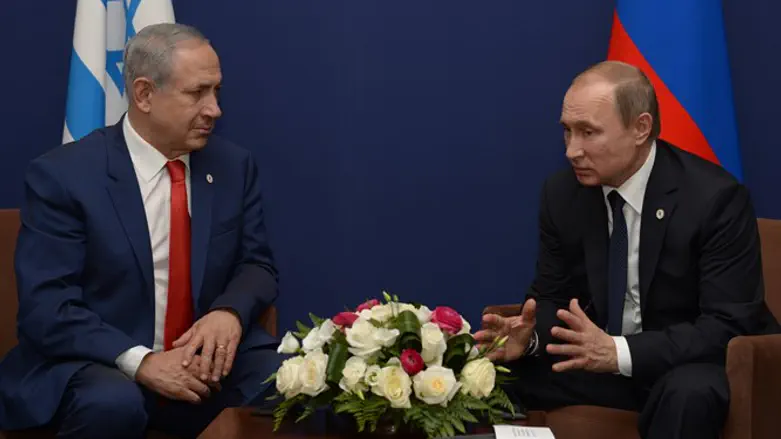
Russian President Vladimir Putin and Israeli Prime Minister Binyamin Netanyahu will convene on Thursday to discuss the “current situation in the Middle East, particularly in light of joint efforts to combat international terrorism,” the Kremlin said on Monday. The Israeli-Palestinian peace process will also be on the agenda, according to the Kremlin.
At the start of Sunday’s cabinet meeting in Jerusalem, Netanyahu said Syria and the international diplomatic efforts to hammer out a deal to bring the six-year-old conflict there to an end would be the focus of the meeting.
“In the context of this agreement, or without it, Iran is trying to establish itself permanently in Syria, with a military presence on the ground and at sea, and also a gradual attempt to open a front against us on the Golan Heights,” Netanyahu said. “I will express to President Putin Israel’s sharp and vigorous opposition to this possibility and about the possibility Israel will choose to attack. I hope we will be able to come to the understandings necessary to prevent as much as possible confrontations between Russian and Israeli forces - just as we have been able to do until now."
Thursday will mark Netanyahu’s fifth meeting with Putin over the past year and a half since the start of Russia’s military intervention in Syria. The two have also spoken by phone on numerous other occasions.
In an interview with Algemeiner, Sarah Fainberg — a research fellow at the Institute for National Security Studies (INSS) in Tel Aviv who specializes in Russia — said that what will differentiate this Putin-Netanyahu meeting from the past ones is the context of the Syria-related diplomacy now taking place.
“Israel is not currently a player in the big power discussions about a political settlement in Syria and the division of the country into zones of influence,” she said. “So Israel is not only seeking to set red lines, but also wants to be an integral part in the talks about the future redesign of Syria.”
“Israel needs to enter that conversation because the threat to Israel is not only a few missiles crossing the border into the Golan Heights, but the establishment of a permanent ‘Hezbollah-stan’ on its northeastern border,” she continued.
The minimum Netanyahu will ask of Putin on Thursday, Fainberg said, is that Israel be permitted to maintain its freedom of action in Syrian territory — “meaning strikes, such as those that have been attributed to Israel by foreign media, and the surveillance monitoring of Hezbollah and developments on the ground in Syria.”
“In any case,” she stated, “this is something that Russia has already accepted. It has always turned a blind eye to any Israeli action in the area.”
However, a potential Netanyahu request that Putin might not accede to, according to Feinberg, was that Russia prevent the permanent establishment of Hezbollah in southern Syria after the war in that country concludes.
“Like the Turks are against having a Kurdish state on their border, Israel is against having an Iranian proxy on its border,” she said, “Israel wants to make sure that when the foreign fighters will be asked to leave Syria, this includes Hezbollah. Iran is expanding its grip in Syria, Lebanon Yemen, Bahrain and so forth,” she went on to say. “Israel wants to roll Iran back to its corner. This is a point where the interests of Israel and Russia don’t coincide,” she cautioned.
Russia, Fainberg also pointed out, has “limited leverage over Iran and Hezbollah.” There has been speculation in the Russian media, Fainberg said, that Netanyahu could serve as a bridge between Moscow and Washington, who have failed to cooperate diplomatically in recent years.
“Netanyahu just met with [US President Donald] Trump,” she stated. “And the impression in Moscow is that they reached some kind of understanding on Syria and the Palestinian question. This might not be reality, but it is the Russian impression.”
Given Trump’s vague views on the Israeli-Palestinian conflict, it is possible that Russia could try to prioritize the matter and position itself as a key mediator, Fainberg assessed. “The Russians might seize this opportunity to put pressure on Israel,” she said, noting Israeli opposition Leader Isaac Herzog’s current visit to Moscow, which was at the invitation of the Russian Duma’s Foreign Affairs Committee. “It’s something to watch. The [Putin-Netanyahu] meeting is not only about Syria."